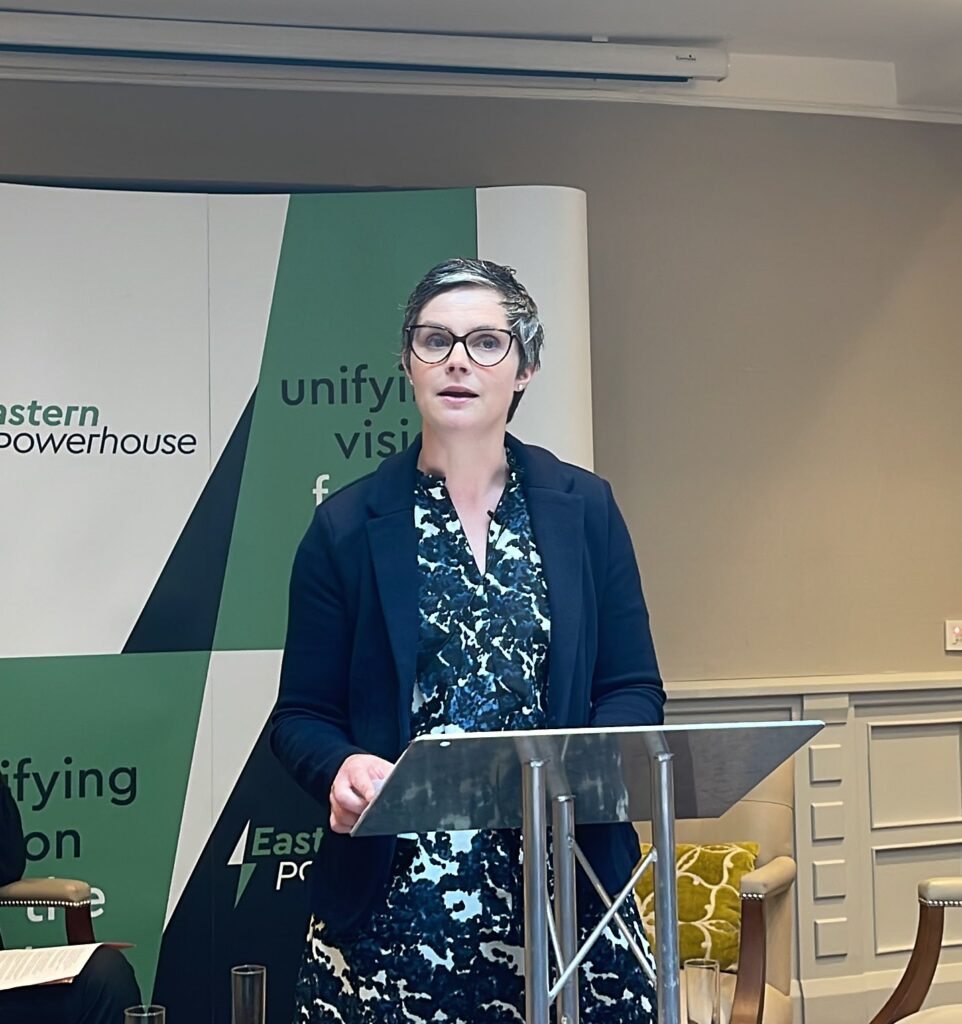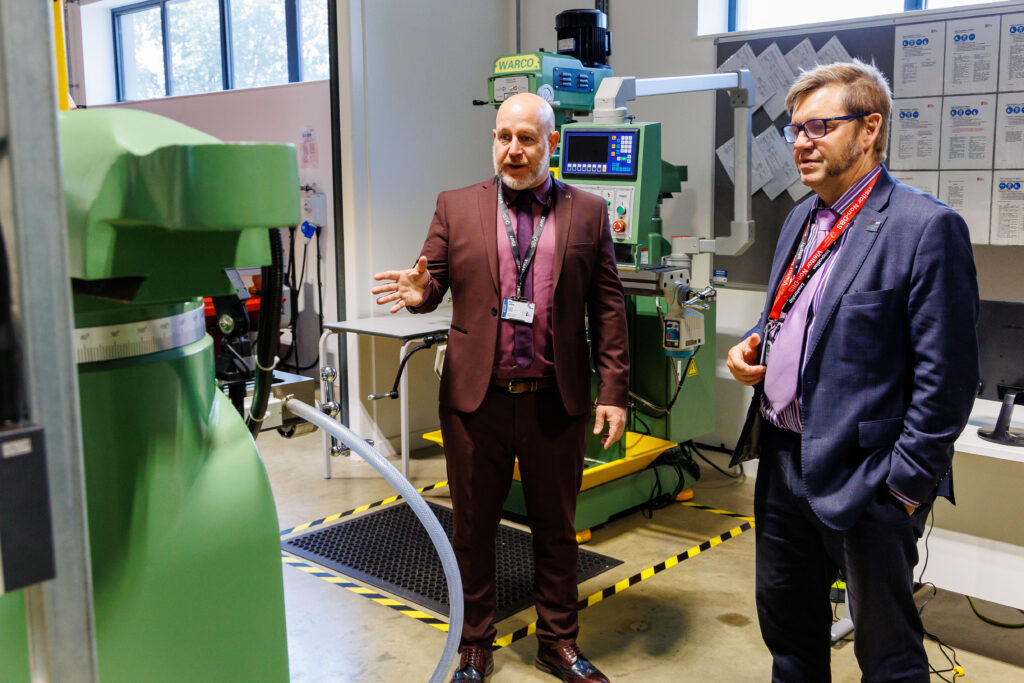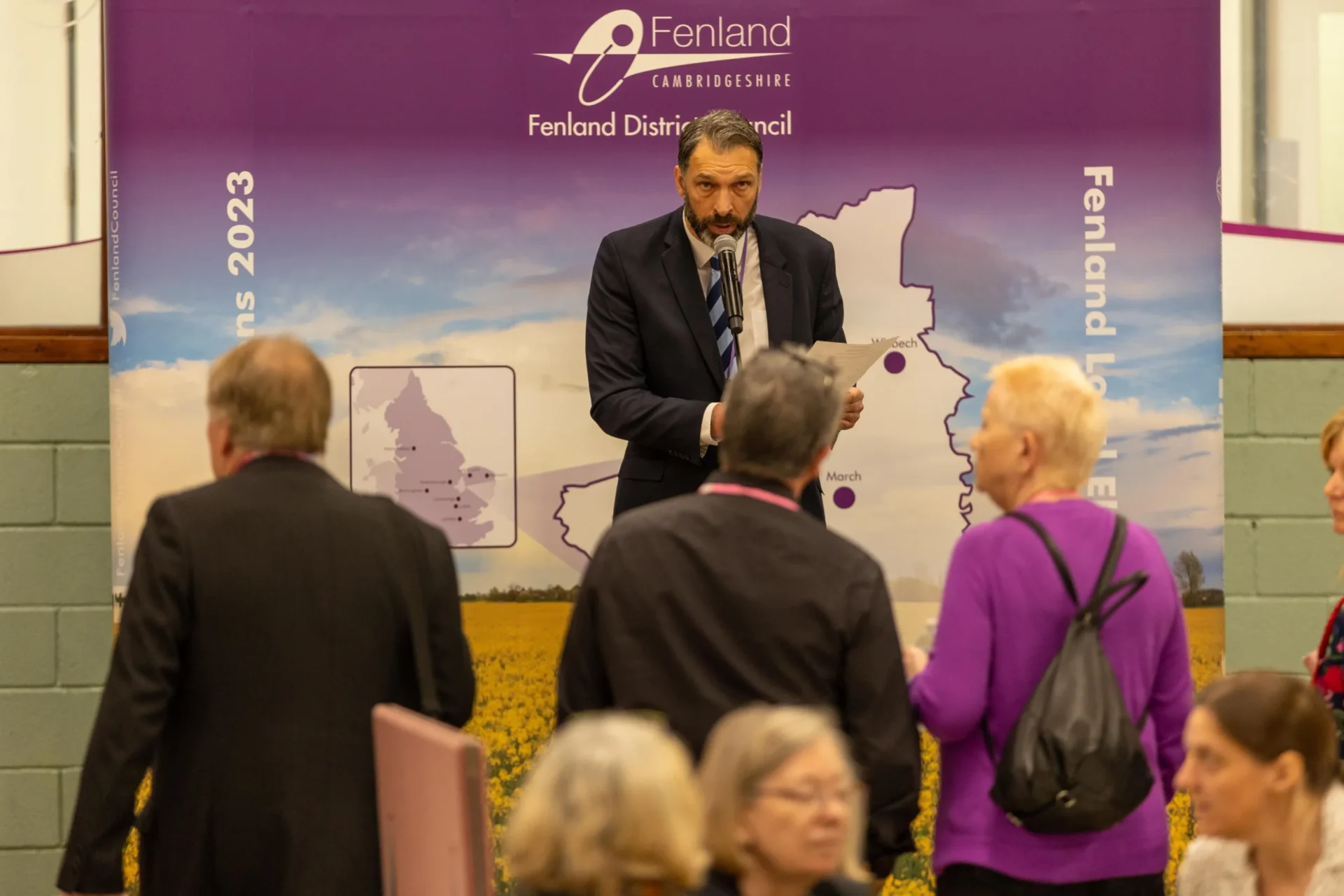Rt Hon Chloe Smith MP keynote speech to Eastern Powerhouse Conference in Cambridge this week. What does the East of England need to succeed?
Six and a half million people got up this morning in the East of England and travelled to work or school or college or perhaps down the high street or to the supermarket in 120 towns and cities.
Over 800,000 businesses opened the factory or office or laboratory door this morning.
Eight universities welcomed students, four international airports fielded arrivals and departures.
The UK’s largest container port shifts over ten thousand units today, connecting our region and the UK to 700 other ports around the world.
That is the East of England. We are a powerhouse.
In fact, we are one of only three net contributors to the taxes of the UK economy, along with London and our friends over the Thames in the South East.
The East adds gross value of over one hundred and seventy billion pounds, and exports internationally eighteen billion pounds of services.
We are pretty industrious: we’ve the highest employment rate in the country.
So, what’s the problem?
It’s a problem known to any hardworking, ambitious person: we can do more.
We can give our people even more value. We can give our kids even more opportunities after school or college or university. We can create more connections, inspire more innovation, invent more, discover more, and change lives.
All from here in the East of England.
I’m delighted to be with you today, having worked with the team since the early days of the Eastern Powerhouse, because I share James’ vision of driving economic growth across the region.
It’s so important to have a forum like today, backed up by the work that the EPH does year-round as an independent, business-led, membership body, where we can further that vision.
We do it in partnership: by collaborating with the private sector, universities, colleges, local authorities, MPs and more, the EPH sets out to maximise the region’s assets and unlock growth opportunities for investment, achieving local, national, and global impact.
And it’s vital that we do it together, across the East of England. Cambridgeshire, South Lincolnshire, Norfolk, Suffolk, Essex, Bedfordshire, and Hertfordshire. That’s a team that packs a punch. Bringing together the entire East of England, and serving as a unified voice of business leadership, has been a critical achievement of the organisation.
But the journey ahead for the Eastern Powerhouse, and the region we lead, is a demanding one.

I’m glad you’re looking ahead today to the next 20 years, like in the Growth for the Nation panel discussion. And it’s only right to take an in depth look at the Opportunities and Challenges in the Economy of the East, coming up later in the agenda.
James (Palmer, chairman) has asked me to address the theme of what the East of England needs to succeed.
I want to start with what we hear from business.
Businesses tell us that the EPH should focus on education and skills and on workforce development. That it’s important to work with partners to promote the scientific, technological, and industrial developments required to ensure that the East is a world leading innovation-led ecosystem. And that we all benefit if we can secure improvements to vital infrastructure, including transport and housing.
We also know from the local economic plans of all the counties that there are some common themes of real substance.
Focus on innovation and technology…. Develop skills and enhance education.
Improve infrastructure and connectivity… Support enterprise, growth, trade, and investment.
Secure environmental sustainability… Get housing and development right.
None of these can be done in isolation, and none can be successfully done without partnership.
I believe that four things in particular are important in how the East and its people will succeed: Investment. Talent. Technology. And resilience.
Starting with infrastructure. We have seen some undeniably significant achievements in the last period, so let’s get the real baseline right.
In transport terms:
- The major artery of the A14 is improved between Cambridge and Huntingdon, supporting connectivity and commerce.
- The A11 is dualled
- There are new bridges in Great Yarmouth and Lowestoft
- There are brand new carriages on the railway across the region
- East West Rail is underway
- Cambridge North Station is bustling
- Luton Airport is to expand
- And the National Infrastructure and Construction Pipeline 2023 includes more that will benefit the East, such as on the M25 and A12.
Of course, essential infrastructure goes beyond only transport:
- £300m of Next Generation Infrastructure is being put in at the labs of the Sainsbury and John Innes Centres
- £40m is improving Great Yarmouth Flood Defences
- Billions of pounds of taxpayers’ money is going into health infrastructure like the QEH hospital that serves so many in Norfolk and Lincolnshire
- And gigabit coverage for the East of England has exploded from 28% just three years ago to 79% today
We know that in the East of England public spending reflects the diversity of our place, with millions of pounds spanning funds for towns, high streets and levelling up; for growth in coastal communities; and for transforming cities.

Public spending and public capital spending in our region is up, but we can also see from the extent of that roundup that there is a need for a clear, coherent, strategic path forward that pulls together to get the best out of these hard-earned pounds.
So, what’s next in infrastructure?
Roads, rail, energy, public services, knowledge infrastructure and digital connectivity should all remain priorities for the Powerhouse to advocate to Government on behalf of business and citizens.
And the Powerhouse should continue to make a unified case for those interventions.
Because it matters beyond bricks, asphalt, steel, or fibre.
It matters to people. Talent is the second item of vital importance in the East.
With the highest employment rate in the country, and so many outstanding innovators, not least here in Cambridge but spread throughout the counties, we clearly have talented people.
But strategically, talent and workforce are going to be central to the success of firms here for a generation ahead. As the CIPD commented just this week, “the big picture shows that despite the labour market reverting to somewhat of a post-COVID normality, there continues to be a high level of vacancies by historic standards.” Nationally, thirty-seven per cent of employers surveyed have hard-to-fill vacancies.
Meanwhile, one in five of working age adults in our nation and in our region are not in the workforce.
The best workplaces have already realised that they need to stay focused on skills, training, flexibility, and diversity of talent. Employers will look for talent in new places, and they will also look for productivity and augmentation of great people through innovation and use of technology.
We hear the same from businesses across the East, who told us through the Local Skills Improvement Plan process that they want employer-led initiatives in identifying skill needs and shaping training programmes.
They want the skills that are right for emerging industries, such as digital competencies and green skills.
They want the skills that continue to support our strengths, and I noticed this correlation in a quick study of the specialisms of five East of England University Technical Colleges, ten-year young institutes that focus on technical education for 14- to 19-year-olds, usually backed by universities and employers.
- UTC Cambridge – biomedical and environmental sciences.
- Harlow’s UTC – environmental engineering and medical technology.
- Elstree UTC in Hertfordshire – entertainment technologies and electrical engineering.
- Lincoln UTC - engineering and core sciences.
- Norfolk UTC - advanced engineering and energy skills.
Businesses are clear they need soft skills development. They value partnerships and collaboration. They want to include and draw on everyone’s talents.
And they want to learn and adapt. This is as critical today as it was in the 20th century when Norwich still made shoes and mustard, and in the 19th or 18th centuries when the Fens were transformed by modern drainage.
In this century, it is my belief that we could create a new vision of labour market dynamics that applies AI to connect people to the opportunities of today and tomorrow, without the delay, the cost, the friction, the disillusionment that can all too often be a feature of job searching or training or using welfare.
The East will succeed using technology. As I said with a Powerhouse audience last year in Norwich, the Eastern region pioneers some of the highest quality scientific research the UK has to offer.
In Cambridge and Norwich and beyond, our research and development puts Britain at the innovative forefront of scientific and technological breakthroughs globally. That work, by the brightest minds across the scientific and technological community, changes lives and puts the East on the international map. That work must continue.
Finally, I reiterate that resilience is important to the success of the East.
We are part of a world full of change and risk.
As the energy landscape moves, our region is on the front line. Literally – as villages such as Happisburgh in Norfolk experience the brutal reality of coastal erosion. And also, economically – the region contains half of the UK’s wind turbines.
Other global threats reach our shores, as the attacks on shipping in the Red Sea hit goods destined for our high streets.
And we experience technological and cultural uncertainty, as the still-maturing matrix of risks and opportunities from AI affects everyday life and work.
And, guided by 15 years of public service as a constituency MP, I can empathise with people feeling anxious about these forces.
Five terms of being trusted in office indelibly teaches me to put people first.
To be clear, this speech is not a party political one. It is a speech about choices for our region that will help people to prosper.
We will prosper best if we work together. As a group of proud cities and counties, and as a partnership between public and private.
In conclusion
As I leave public service this year, I am feeling thoughtful and reflective about the challenges we face.
I know that many of our challenges cannot be overcome only by the state or only by business.
I know that if we set ambitious goals with a pride in place, we can achieve them – because I’ve done that in Norwich, with many partners who are connected to this very conference.
I know that maximising the productivity of our amazing people, and harnessing technology, is the mission of our times.
I also know that we need great leadership to do this.
And that’s why EPH matters.
My message to you all, and to the next generation of leaders in the service of our region and our country? POWER ON! Don’t stop.
Thank you and enjoy the conference.
Chloe Smith was previously appointed Secretary of State for Science, Innovation and Technology from 28 April 2023 to 20 July 2023 while the Rt Hon Michelle Donelan MP was on maternity leave.
She was elected Conservative MP for Norwich North on 23 July 2009.


























